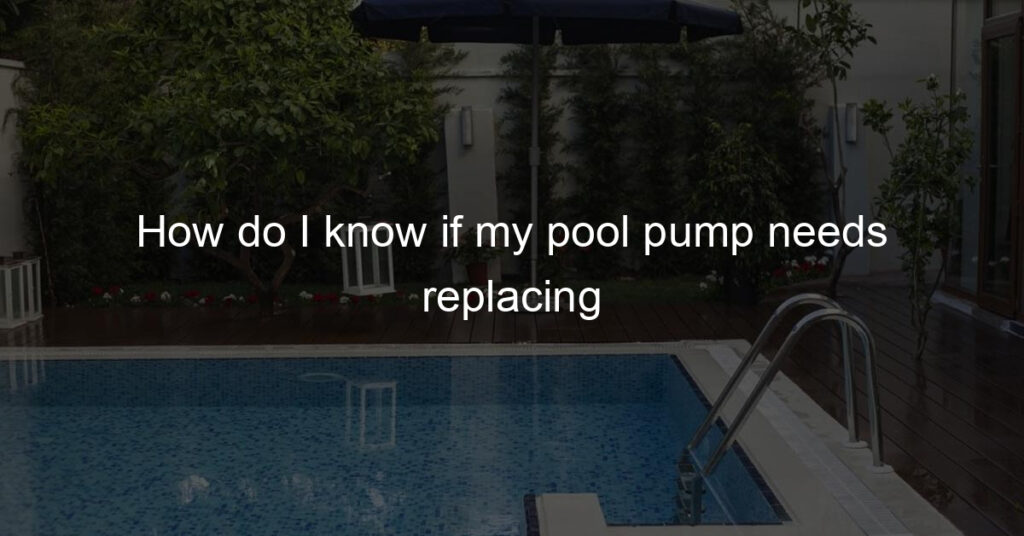How Do I Know If My Pool Pump Needs Replacing
Attention, pool owners! Are you wondering if it’s time to bid farewell to your trusty pool pump? Dive into this article as we explore the telltale signs that indicate whether your pool pump is in need of a replacement.
From declining performance to strange noises and energy inefficiency, we’ll unravel the mysteries of pool pump maintenance and guide you toward making the right decision for your aquatic oasis.
So, get ready to make a splash in the world of pool pump diagnostics and discover the signs that should have you considering an upgrade.
Decreased Water Circulation and Poor Filtering
One of the key indicators that your pool pump may need replacing is a noticeable decrease in water circulation and poor filtering.
If you notice that the water in your pool is not circulating as efficiently as before, it could be a sign that your pump is losing its effectiveness. Insufficient water circulation can lead to stagnant areas in your pool, making it prone to algae growth and poor water quality.
Additionally, if you observe that your pool filter is struggling to remove debris and leaves from the water, it could indicate that your pump is not providing adequate suction power. These issues may suggest that your pool pump is no longer functioning optimally and requires replacement.
Unusual Noises and Vibrations
Unusual noises and vibrations coming from your pool pump can be another warning sign that it needs replacing. While some level of noise and vibration is expected, especially during pump operation, excessive or strange sounds could indicate underlying problems.
Grinding, screeching, or rattling noises may suggest issues with the pump’s bearings, impeller, or motor. Similarly, excessive vibrations could be a result of misaligned or worn-out parts.
If you notice any abnormal sounds or vibrations coming from your pump, it’s important to have it inspected to determine if replacement is necessary to avoid potential damage or breakdowns.
Inconsistent or Weak Water Pressure
Inconsistent or weak water pressure is a clear indication that your pool pump may be nearing the end of its lifespan. If you notice a significant drop in water pressure or irregular flow patterns from your pool’s return jets, it could be due to a malfunctioning pump.
Inadequate water pressure can impede proper circulation, filtration, and the overall enjoyment of your pool. It could be caused by various factors, such as a clogged impeller, worn-out seals, or a failing motor.
To maintain optimal water pressure and ensure a refreshing swimming experience, it’s crucial to consider replacing your pool pump if this issue persists.
Excessive Energy Consumption
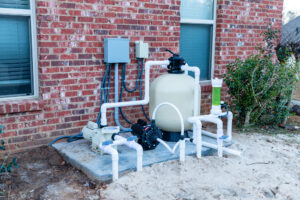
Another factor to consider when assessing the need for pool pump replacement is excessive energy consumption. Older pool pumps, especially those without variable speed settings, tend to consume more energy compared to modern, energy-efficient models. If you notice a significant increase in your energy bills, it may be a sign that your pool pump is operating inefficiently.
Upgrading to a more energy-efficient pump can not only save you money in the long run but also contribute to reducing your carbon footprint.
Persistent Leaks and Water Loss
Persistent leaks and water loss around your pool pump should not be ignored, as they can indicate serious underlying issues.
Leaks can occur due to deteriorating seals, cracks in the pump housing, or damaged fittings. If you consistently find pools of water or notice a drop in your pool’s water level near the pump area, it’s crucial to have the issue addressed promptly.
Ignoring leaks can lead to further damage to your pump and potentially impact the surrounding equipment. In such cases, replacing the pool pump may be the most viable solution to ensure proper functionality and prevent further water loss.
Age of the Pool Pump
Considering the age of your pool pump is essential in determining whether it needs replacing. Like any mechanical equipment, pool pumps have a limited lifespan.
The average lifespan of a pool pump typically ranges from 8 to 15 years, depending on usage, maintenance, and the quality of the pump itself. If your pump is nearing or exceeding this age range, it may be more susceptible to frequent breakdowns, decreased efficiency, and costly repairs.
Evaluating the age of your pool pump can help you make an informed decision about whether it’s time to invest in a new, more reliable unit.
Difficulty Priming or Starting the Pump
If you experience difficulties priming or starting your pool pump, it could be a sign that it’s reaching the end of its useful life.
Priming is the process of removing air from the pump system to allow proper water flow. A worn-out pump may struggle to prime efficiently, leading to airlocks, reduced water circulation, and potential damage to the pump.
Similarly, if your pump consistently fails to start or requires repeated attempts, it may indicate internal issues or motor failure. If you find yourself frequently struggling with priming or starting your pool pump, it’s advisable to consult a professional and consider replacing the pump if necessary.
Failure to Maintain Desired Water Chemistry
A pool pump plays a crucial role in maintaining the desired water chemistry by circulating and filtering the water effectively.
If you consistently find it challenging to maintain proper water balance, including pH levels, alkalinity, and sanitizer levels, it could be a sign that your pump is no longer performing its job adequately.
Insufficient water circulation and poor filtration can lead to imbalances in water chemistry, making it difficult to maintain a safe and comfortable swimming environment.
Upgrading to a new pool pump with improved circulation and filtration capabilities can help restore and maintain the desired water chemistry more effectively.
Frequent Breakdowns and Repairs
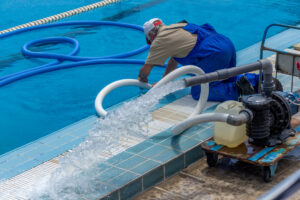
If your pool pump requires frequent repairs or experiences recurring breakdowns, it may be a clear indication that it’s time for a replacement.
While occasional repairs and maintenance are expected, constant issues with your pump can be a frustrating and costly ordeal. Continuously investing in repairs can quickly add up in terms of time, effort, and expenses.
Assess the frequency and severity of breakdowns and repairs your pool pump requires, and consider whether it makes more sense to replace the pump altogether for a more reliable and hassle-free pool ownership experience.
Motor Overheating or Burning Smell
Motor overheating or a distinct burning smell emanating from your pool pump should not be ignored, as they can signify severe mechanical issues. An overheating motor could be caused by various factors, such as poor ventilation, worn-out bearings, or a failing capacitor.
Additionally, a burning smell is often an indication of electrical problems within the pump. Continuing to operate an overheating pump can result in irreversible damage to the motor and other components.
If you experience motor overheating or detect a burning smell, it’s crucial to shut off the pump immediately and seek professional assistance to determine if a replacement is necessary.
Outdated or Inefficient Pump Technology
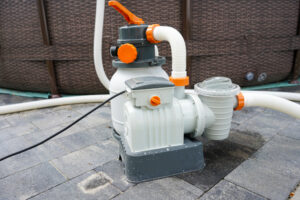
Advancements in pool pump technology have led to more efficient and cost-effective options in recent years. If your current pool pump is outdated or lacks modern features like variable speed settings, it may be worth considering an upgrade.
Variable speed pumps allow you to adjust the speed and flow rate to match your pool’s needs, resulting in significant energy savings.
Furthermore, newer models often incorporate advanced features such as digital controls, timers, and self-diagnostic capabilities, which enhance overall efficiency and ease of use.
Assessing the technological advancements your current pump lacks can help you make an informed decision about upgrading to a more advanced and efficient model.
Inadequate Flow Rate and Pool Cleaning
A pool pump with an inadequate flow rate can significantly impact the effectiveness of pool cleaning systems, such as automatic cleaners or skimmers. Insufficient flow can result in poor suction, rendering these systems less efficient in removing debris from your pool’s surfaces and water.
If you notice that your pool is not as clean as it used to be, or if your automatic cleaner is struggling to operate effectively, it may be a sign that your pump is not providing an adequate flow rate.
Upgrading to a more powerful and efficient pump can ensure proper circulation, improve pool cleaning performance, and maintain pristine water quality.
Compatibility with Modern Pool Automation Systems
If you’ve recently invested in a modern pool automation system or are planning to do so, it’s essential to ensure compatibility with your existing pool pump. Older pumps may not have the necessary features or compatibility to seamlessly integrate with advanced automation systems.
Upgrading to a pump that is compatible with your automation system allows you to take full advantage of the convenience and control offered by these systems.
It enables you to effortlessly manage and monitor your pool’s operations, such as adjusting pump speed, scheduling, and monitoring energy consumption, all from the convenience of your smartphone or tablet.
| Parameters | Signs of Need for Replacement |
| Water Circulation | Decreased flow, poor filtering, stagnant areas |
| Noise and Vibrations | Grinding, screeching, rattling noises, excessive vibrations |
| Energy Consumption | Excessive energy usage, higher utility bills |
| Age of the Pump | Approaching or exceeding the average lifespan |
| Inconsistent Water Pressure | Irregular flow patterns, weak water pressure |
| Persistent Leaks | Water pooling around the pump, drop in water level |
| Difficult Priming | Airlocks, reduced water circulation, priming failures |
| Water Chemistry Issues | Difficulty maintaining proper pH, sanitizer levels |
| Frequent Breakdowns | Requiring frequent repairs, recurring malfunctions |
| Motor Overheating | Overheating motor, burning smell |
| Outdated Technology | Lack of variable speed settings, outdated features |
| Inadequate Flow Rate | Poor performance of pool cleaning systems |
| Compatibility with Automation Systems | Incompatibility with modern automation systems |
Approximate Lifespan of a Pool Pump
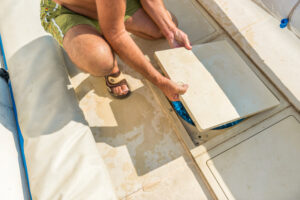
The average lifespan of a pool pump typically ranges from 8 to 15 years, depending on factors such as usage, maintenance, and the quality of the pump itself. It’s important to consider the age of your pump when evaluating the need for replacement.
Costs and Work Involved in Replacing the Pump
The cost of replacing a pool pump can vary depending on factors such as the type of pump, the brand, and additional installation requirements. On average, the cost of a new pool pump can range from $300 to $1,500 or more. Additionally, you may need to consider the cost of professional installation if you’re not confident in doing it yourself.
The work involved in replacing a pool pump generally includes the following steps:
- Selection of the New Pump: Research and choose a suitable replacement pump that meets the requirements of your pool, taking into account factors such as flow rate, horsepower, and energy efficiency.
- Draining the Pool: In some cases, it may be necessary to partially or completely drain the pool to access the pump and disconnect it from the plumbing system. This step ensures a safe and efficient replacement process.
- Disconnecting the Old Pump: Disconnecting the old pump from the electrical supply and plumbing connections. This may involve unscrewing fittings, removing wires, and detaching the pump from its mounting.
- Installing the New Pump: Install the new pump by following the manufacturer’s instructions. This typically involves connecting the plumbing lines, securing the pump to its mounting, and wiring it to the electrical supply.
- Priming and Testing: Prime the pump by removing any air trapped in the system, and then test its operation to ensure proper circulation, filtration, and pressure.
- Disposal of the Old Pump: Properly dispose of the old pump according to local regulations. Some municipalities may have specific guidelines for the disposal of electronic equipment.
It’s important to note that if you’re not experienced in pool equipment installation or electrical work, it’s recommended to hire a professional pool technician or electrician to ensure the replacement is done safely and correctly.
Remember, these costs and the work involved may vary depending on your specific situation, pool size, and location. It’s always advisable to consult with professionals or seek multiple quotes to get a better understanding of the costs and requirements involved in replacing your pool pump.
In conclusion,
keeping your pool pump in good condition is vital for a sparkling and enjoyable swimming experience.
By recognizing the signs of a failing pump, such as decreased water circulation, strange noises, and energy inefficiency, you can take action before bigger problems arise.
Remember, a pump’s average lifespan is around 8 to 15 years, so don’t hesitate to consider a replacement if yours is showing signs of age. While there may be costs involved, the benefits of a new, efficient pump are worth it in the long run.
With a properly functioning pump, you can maintain crystal-clear water, relax with peace of mind, and dive into a summer full of endless poolside fun!

